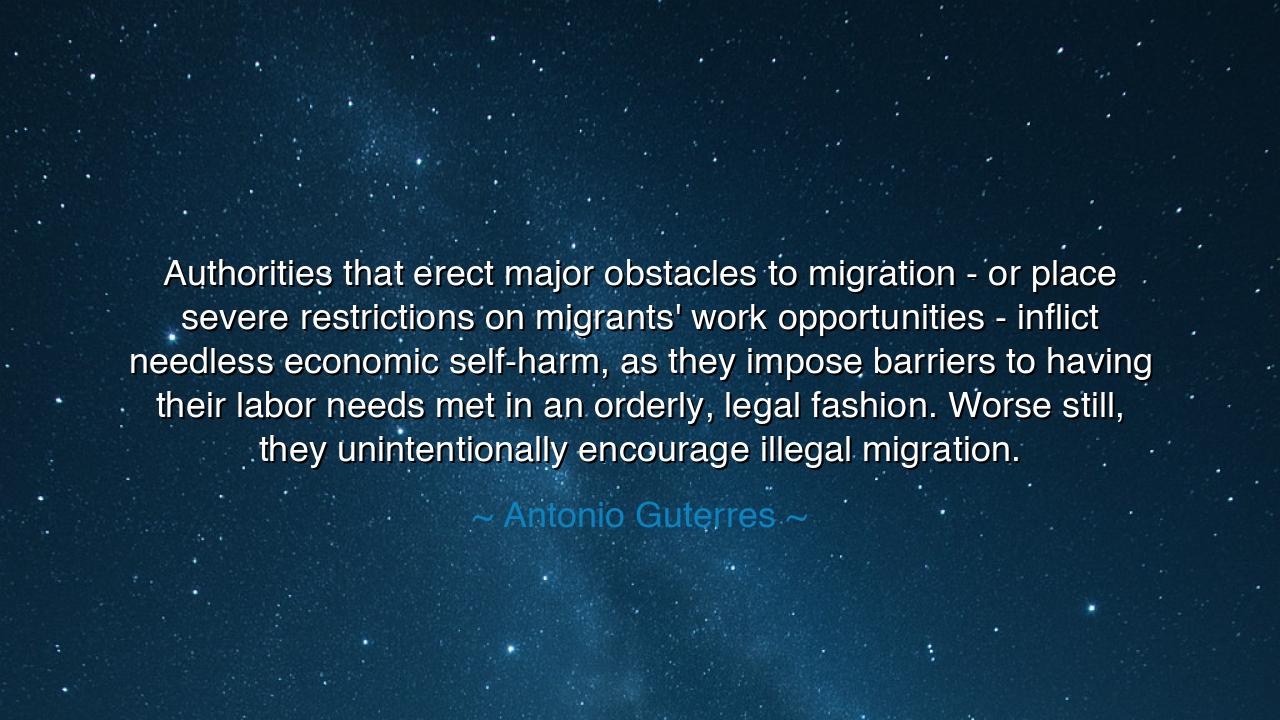
Authorities that erect major obstacles to migration - or place
Authorities that erect major obstacles to migration - or place severe restrictions on migrants' work opportunities - inflict needless economic self-harm, as they impose barriers to having their labor needs met in an orderly, legal fashion. Worse still, they unintentionally encourage illegal migration.






“Authorities that erect major obstacles to migration—or place severe restrictions on migrants' work opportunities—inflict needless economic self-harm, as they impose barriers to having their labor needs met in an orderly, legal fashion. Worse still, they unintentionally encourage illegal migration.” Thus spoke António Guterres, Secretary-General of the United Nations and a statesman of deep humanity and foresight. His words flow with both compassion and logic, reminding the rulers of nations that to deny the natural movement of people is to deny one of the oldest and most necessary truths of civilization: that humanity thrives by exchange, not by exclusion. In this statement lies not only political wisdom but moral understanding—the recognition that migration is not a threat to order, but a force of renewal when guided by justice and foresight.
Guterres, who has long borne witness to the tides of humanity displaced by war, poverty, and hope, speaks here not as a bureaucrat but as a sage of the modern world. He has seen nations rise through inclusion and fall through fear. His words were born of observation—of economies weakened not by migrants, but by the barriers placed against them. He understood that when governments close their doors to those who seek honest work, they do not stop the movement of people; they only drive it underground, transforming potential citizens into fugitives and opportunities into crises. The walls built in fear become wounds upon the land, cutting off both compassion and prosperity.
In the days of the ancients, there were no passports, no borders carved in ink. People moved as rivers do, seeking fertile ground where they might live in peace. Empires like Rome, Persia, and China understood that their greatness depended upon the skills and labor of peoples from beyond their original frontiers. The Roman Empire, in its wisdom, welcomed outsiders into its legions and cities, turning strangers into Romans, farmers into citizens, migrants into builders of civilization. But when the Empire grew proud and fearful, when it ceased to integrate and began to exclude, it grew weak and divided. In this history lies the timeless truth of Guterres’s warning: nations that wall themselves off from human potential do not protect their strength—they diminish it.
Consider, too, the story of the United States, a nation forged from the dreams of migrants. For centuries, people from distant shores came seeking freedom and opportunity, and their labor built cities, railroads, farms, and inventions that changed the world. Yet in more recent times, when immigration laws grew restrictive and pathways to legal work scarce, migration did not stop—it merely shifted into the shadows. Fields still needed workers; factories still needed hands; homes still needed care. But the migrants who filled those needs were often forced to do so without rights or safety, living in fear rather than belonging. In this, America—like many nations—learned what Guterres now warns: that when legal paths are closed, illegal ones are opened, not by the will of the migrant, but by the necessity of life itself.
Guterres’s insight carries an even deeper message about the nature of humanity. To migrate is to seek life, and life cannot be contained by decree. The hungry will cross deserts, the desperate will brave seas, and the hopeful will climb walls—because within them burns the same spirit that once carried explorers across oceans and settlers into wilderness. When governments criminalize this instinct without offering lawful means for it to breathe, they do not stop movement—they corrupt it. Injustice then breeds suffering, and suffering breeds instability. Thus, in the attempt to secure order, nations often sow disorder; in the effort to protect their borders, they endanger their souls.
Economically, the Secretary-General’s wisdom shines with practical truth. Nations that embrace legal migration often find renewal in their workforce, innovation in their industries, and vitality in their culture. Migrants fill gaps in aging economies, sustain healthcare systems, and enrich societies with new perspectives. When barriers are too rigid, economies suffer from labor shortages, and businesses turn to informal or illegal means to survive. Thus, as Guterres warns, policies born of fear become instruments of self-harm. The wise leader must therefore act not with fear, but with foresight—to build systems that are both fair and functional, compassionate and secure.
The lesson, dear listener, is eternal: human movement is the pulse of civilization. No wall, no law, no edict has ever stilled it for long. To guide that movement with justice is wisdom; to deny it outright is folly. Nations should remember that compassion and pragmatism are not enemies, but allies—that to allow people lawful entry and fair labor is not weakness, but strength. Let every citizen and leader ask not how to build higher walls, but how to build stronger bridges—bridges of law, opportunity, and understanding.
So remember the wisdom of António Guterres, children of the future: when fear governs policy, nations wound themselves; when wisdom governs, they prosper. Migration is not a curse to be contained—it is a current to be channeled, a force to be guided toward order, legality, and shared benefit. Therefore, let your hearts be firm, your minds be open, and your laws be just. For only when humanity learns to walk together—each person free to labor, to dream, and to live in dignity—will the world find peace that is both prosperous and enduring.






AAdministratorAdministrator
Welcome, honored guests. Please leave a comment, we will respond soon